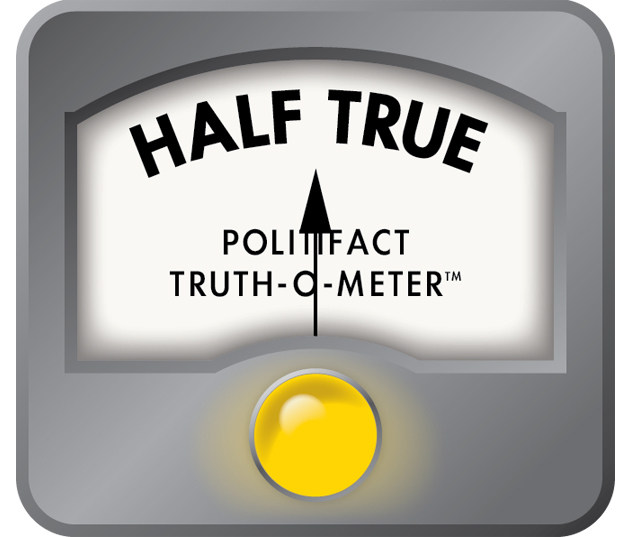Get PolitiFact in your inbox.
Paul Ryan's partially accurate claim that House tax bill saves typical Wisconsin household $2,000
U.S. House Speaker Paul Ryan is pushing back against criticism of a GOP tax plan that he hopes will become law before the end of the year.
In a Dec. 1, 2017 National Public Radio interview, the Wisconsin Republican repeated his argument that the House version of tax reform is a middle-class tax cut. Then he made a claim about Wisconsin, saying:
This is designed to be a middle-class tax cut. I think the people who are concerned the most are some of the big businesses; that's where we hear most of the complaints about. But this is a middle-class tax cut, no two ways about it. I just ran the numbers of Wisconsin. The median family of four -- the median household of four -- gets about a $2,000 tax cut, on average.
Ryan’s $2,000 claim is correct -- as far as it goes.
But it leaves out some important information.
The $2,000
To defend Ryan’s statement, his office referred us to the U.S. House Ways and Means Committee. A spokeswoman for the committee provided us these figures, which compare current law to the House bill, known as the Tax Cuts and Jobs Act.
The figures are for a Wisconsin household of four -- a couple with two minor children -- based on 2016 U.S. Census data for median income.
The median income -- $91,532 -- means that half of four-person households in the state earned more than that in 2016 and half earned less.
Current law
House tax plan
Adjusted gross income
$91,532
$91,532
Standard deduction
$13,000
$24,440
Personal exemptions
$16,000
0
Taxable income
$61,932
$67,132
10% bracket
$1,905
---
12% bracket
---
$8,056
15% bracket
$6,432
---
Preliminary liability
$8,337
$8,056
Child tax credit
$2,000 ($1,000 per child)
$3,200 ($1,600 per child)
Family credits
---
$600 ($300 per parent)
Tax liability
$6,337
$4,256
Tax savings in 2018
---
$2,081
(The House bill would make several changes in the tax brackets, including replacing the 10 percent bracket with a 12 percent bracket.)
The $2,081 savings figure is correct, according to experts at four think tanks we contacted: Amir El-Sibaie, an analyst at the Tax Foundation; Chuck Marr, director of federal tax policy at the Center on Budget and Policy Priorities; and Urban-Brookings Tax Policy Center senior fellow Frank Sammartino; and Institute on Taxation and Economic Policy deputy director Meg Wiehe.
But the experts agreed there are two important caveats:
1. Ryan’s example assumes the typical household he cites claims a standard deduction, rather than itemizing deductions. But many households at the income level Ryan cites itemize their deductions.
That initial $2,081 in savings could be hundreds less if that household has claimed certain itemized deductions, such as for medical expenses, that would be eliminated by the House bill. (Other deductions eliminated or pared back in the House bill include the mortgage interest deduction, and the state and local tax deduction.)
Marr told us IRS data shows that in 2015, 55 percent of Wisconsin tax filers with an income between $75,000 and $100,000 claimed itemized deductions instead of the standard deduction.
2. Even the household that stand to save $2,081 in 2018 would see that savings decrease each year going forward.
According to these figures Marr provided, the annual savings drops to $767 by 2027:
Year
Tax savings for median income household of four in Wisconsin
2018
$2,081
2019
$1,956
2020
$1,889
2021
$1,819
2022
$1,749
2023
$1,076
2024
$1,018
2025
$903
2026
$827
2027
$767
The savings decline for several reasons, including: The family credit goes away after 2022; there generally aren’t inflation adjustments for the child tax credit; and the personal exemptions would be indexed to a different measure of inflation that increases more slowly.
Our rating
Ryan says that under the House Republican tax plan, in Wisconsin, "the median household of four gets about a $2,000 tax cut, on average."
That’s true if the typical household Ryan describes claims a standard deduction on their taxes rather than itemizing deductions. The savings would be $2,081 -- in 2018.
But many Wisconsin households at that income level would see a savings of several hundred dollars less because they would no longer be able to claim deductions such as one for medical expenses, which the House bill eliminates.
Moreover, because of the way the House bill is written, even the household that saves $2,081 in 2018 would see that savings drop in each year, down to an estimated $767 in 2027.
Ryan’s statement is partially accurate but leaves out important details -- our definition of Half True.
Our Sources
YouTube, National Public Radio Paul Ryan interview (1:45), Dec. 1, 2017
Email, Speaker Paul Ryan spokeswoman AshLee Strong, Dec. 5, 2017
Email, U.S. House Ways and Means Committee communications director Emily Schillinger, Dec. 6, 2017
Email, Tax Foundation analyst Amir El-Sibaie, Dec. 5, 2017
Email, Chuck Marr, director of federal tax policy at the Center on Budget and Policy Priorities, Dec. 6, 2017
Interview, Urban-Brookings Tax Policy Center senior fellow Frank Sammartino, former Congressional Budget Office assistant director for tax analysis and former chief economist and deputy director of the Joint Economic Committee of the U.S. Congress, Dec. 7, 2017
Interview, Institute on Taxation and Economic Policy deputy director Meg Wiehe, Dec. 7, 2017
PolitiFact National, "The House and Senate tax bills, explained," Nov. 28, 2017
Email, Kids Forward research director Jon Peacock, Dec. 6, 2017
PolitiFact National, "Would the House GOP tax plan save a typical family $1,182?" Nov. 3, 2017
PolitiFact National, "Steve Mnuchin uses partial data to say GOP tax bill favors middle-income households," Nov. 20, 2017
PolitiFact National, "Does 70 percent of tax bill's relief go to those making less than $200,000?" Nov. 30, 2017
Browse the Truth-O-Meter
More by Tom Kertscher
Paul Ryan's partially accurate claim that House tax bill saves typical Wisconsin household $2,000
Support independent fact-checking.
Become a member!
In a world of wild talk and fake news, help us stand up for the facts.






 PolitiFact Rating:
PolitiFact Rating: 





























